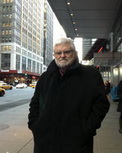 Chris
McDonnell, UK
Chris
McDonnell, UKchristymac733@gmail.com
 Chris
McDonnell, UK
Chris
McDonnell, UK
christymac733@gmail.com
Previous articles by Chris Comments welcome here
October
24, 2018
Who
calls the tune?
We live in a world of rising nationalism where the leadership of individuals is a prominent feature of a new order. It can at times be disconcerting. Even as the problems facing us become global in their extent, our attention is focused on the smaller issues of selfish, national concern. In 1624, John Donne wrote those few words that are often quoted "No man is an island". Yet our behavior continues to ignore their truth as the individualistic ‘me’ generation raises it voice.
What are the elements of leadership, the styles demonstrated that we should foster and encourage, leadership that might indicate the road to a saner approach to our present problems? And what should be the warning signs that these principles are in danger of distortion? Who leads when the leaders don’t know how to govern?
Leaders anticipate change, they are not hamstrung by circumstance but dare to be different. Time and again in the Gospel narrative we see Jesus fulfill that role, only to be challenged by those whose vision was restricted. Those with the imagination to find new paths have the courage to abandon the past. They recognize what is preventing change and leave unwanted baggage by the roadside. One of the verses of ‘Go Tell Everyone’ has these words: ‘Don’t carry a load in your pack, You don’t need two shirts on your back A workman can earn his own keep, Can earn his own keep’. Too often people are inhibited by the loads they carry, their journey is slowed by the history that remains attached. How often does the folklore of a nation get in the way of progress as people live in the shadows of the past unable to appreciate the sunlight of a new day?
At the time of the Good Friday Agreement, President Clinton reminded us that "All friends of Ireland and Northern Ireland know the task of making the peace endure will be difficult. The path of peace is never easy. But the parties have made brave decisions. They have chosen hope over hate; the promise of the future over the poison of the past. And in so doing, already they have written a new chapter in the rich history of their island, a chapter of resolute courage that inspires us all". And central to his comment are those few highly significant words - the promise of the future over the poison of the past. Great leadership looks to what might be achieved over and above the mistakes of previous times.
That was the great achievement of Mandela, that in spite of all he and his people had experienced during the savage days of Apartheid, he was able to wear the Springboks Rugby shirt at the World Cup and courageously lead his people.
Leaders dare to be different, and in consequence often pay a high price for taking a stand. The history of events in the 20th Century is littered with their stories. Sometimes the leadership offered was compelling but proved futile. The danger of dictatorship is inherent in the charismatic words of the would-be dictator and the response of the listening crowd. You have only to watch the News clip of a current world leader mocking Dr Christine Ford in front of a laughing Mississippi crowd to realize the threat to common decency in our own time.
In our assessment of the quality of leadership we need to have a clear moral code. The words of Matthew’s Gospel are to the point. ‘Beware of false prophets, who come to you in sheep’s clothing, but inwardly they are ravenous wolves. You will know them by their fruits’
A leader needs to show sensitivity to others who might be followers, for he is the conductor of the group, healing wounds, encouraging self-belief, enabling skills. Isn’t that what happens in the centred love of families, where parents seek to be an example to their children, caring for them, often at a high cost? The leadership on offer is often subtle, sometimes direct, but always there for good reason.
It is the leadership that Francis has shown the Church during his five years in the See of Rome, at times stern and serious, always generously forgiving and in good measure, with the humor of a father for his children. He has taught us the skills of leadership for the next stage of the journey.
When our leaders, in whatever sphere, let us down there is disappointment, often verging on anger. Trust is broken at a heavy price and its consequent damage can be far reaching. That is why attending to the pain we are presently experiencing in the Church demands leadership of the highest quality. We need poetry to tell the truth.
END
====